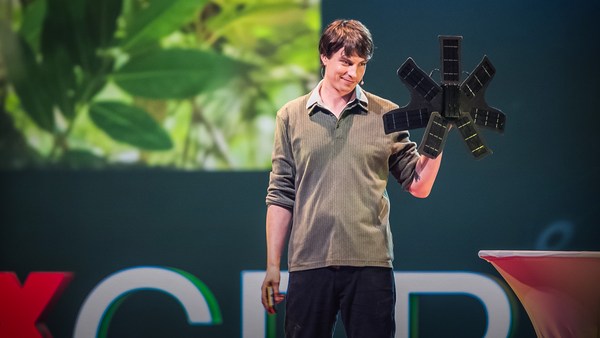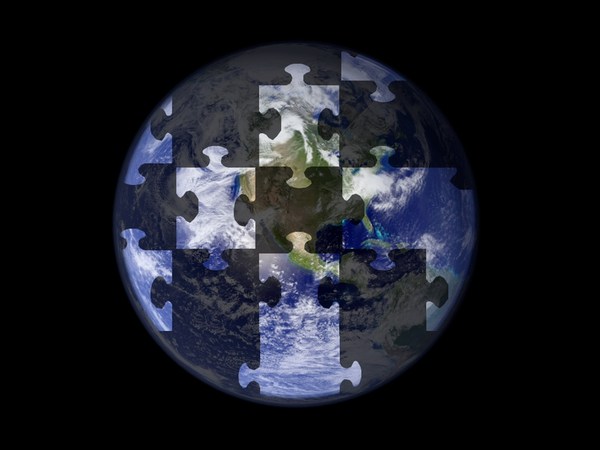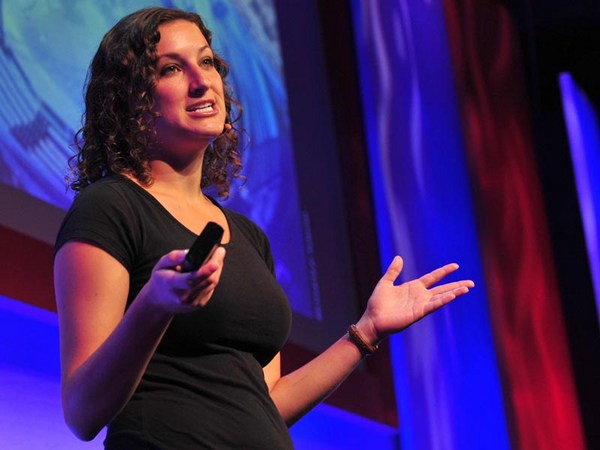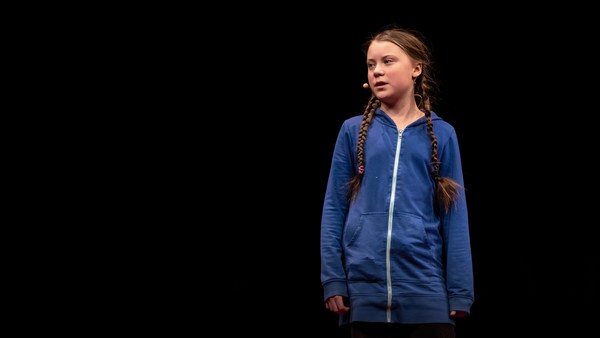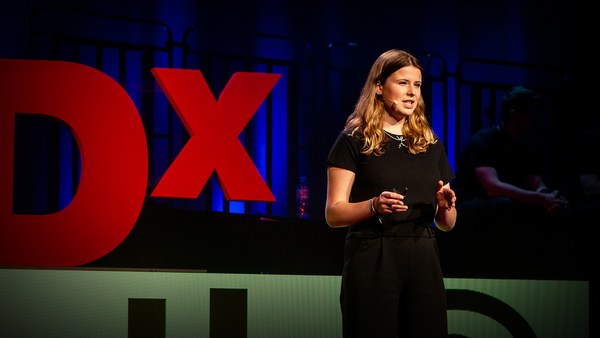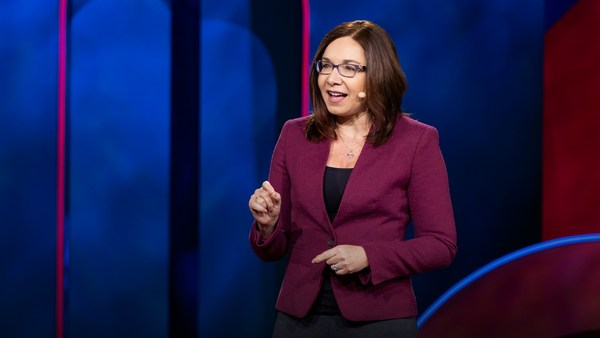A question I'm often asked is, where did I get my passion for human rights and justice? It started early. I grew up in the west of Ireland, wedged between four brothers, two older than me and two younger than me. So of course I had to be interested in human rights, and equality and justice, and using my elbows!
(Laughter)
And those issues stayed with me and guided me, and in particular, when I was elected the first woman President of Ireland, from 1990 to 1997. I dedicated my presidency to having a space for those who felt marginalized on the island of Ireland, and bringing together communities from Northern Ireland with those from the Republic, trying to build peace. And I went as the first Irish president to the United Kingdom and met with Queen Elizabeth II, and also welcomed to my official residence -- which we call "Áras an Uachtaráin," the house of the president -- members of the royal family, including, notably, the Prince of Wales. And I was aware that at the time of my presidency, Ireland was a country beginning a rapid economic progress. We were a country that was benefiting from the solidarity of the European Union. Indeed, when Ireland first joined the European Union in 1973, there were parts of the country that were considered developing, including my own beloved native county, County Mayo. I led trade delegations here to the United States, to Japan, to India, to encourage investment, to help to create jobs, to build up our economy, to build up our health system, our education -- our development.
What I didn't have to do as president was buy land on mainland Europe, so that Irish citizens could go there because our island was going underwater. What I didn't have to think about, either as president or as a constitutional lawyer, was the implications for the sovereignty of the territory because of the impact of climate change. But that is what President Tong, of the Republic of Kiribati, has to wake up every morning thinking about. He has bought land in Fiji as an insurance policy, what he calls, "migration with dignity," because he knows that his people may have to leave their islands. As I listened to President Tong describing the situation, I really felt that this was a problem that no leader should have to face. And as I heard him speak about the pain of his problems, I thought about Eleanor Roosevelt. I thought about her and those who worked with her on the Commission on Human Rights, which she chaired in 1948, and drew up the Universal Declaration of Human Rights. For them, it would have been unimaginable that a whole country could go out of existence because of human-induced climate change.
I came to climate change not as a scientist or an environmental lawyer, and I wasn't really impressed by the images of polar bears or melting glaciers. It was because of the impact on people, and the impact on their rights -- their rights to food and safe water, health, education and shelter. And I say this with humility, because I came late to the issue of climate change. When I served as UN High Commissioner for Human Rights from 1997 to 2002, climate change wasn't at the front of my mind. I don't remember making a single speech on climate change. I knew that there was another part of the United Nations -- the UN Convention on Climate Change -- that was dealing with the issue of climate change. It was later when I started to work in African countries on issues of development and human rights. And I kept hearing this pervasive sentence: "Oh, but things are so much worse now, things are so much worse." And then I explored what was behind that; it was about changes in the climate -- climate shocks, changes in the weather.
I met Constance Okollet, who had formed a women's group in Eastern Uganda, and she told me that when she was growing up, she had a very normal life in her village and they didn't go hungry, they knew that the seasons would come as they were predicted to come, they knew when to sow and they knew when to harvest, and so they had enough food. But, in recent years, at the time of this conversation, they had nothing but long periods of drought, and then flash flooding, and then more drought. The school had been destroyed, livelihoods had been destroyed, their harvest had been destroyed. She forms this women's group to try to keep her community together. And this was a reality that really struck me, because of course, Constance Okollet wasn't responsible for the greenhouse gas emissions that were causing this problem.
Indeed, I was very struck about the situation in Malawi in January of this year. There was an unprecedented flooding in the country, it covered about a third of the country, over 300 people were killed, and hundreds of thousands lost their livelihoods. And the average person in Malawi emits about 80 kg of CO2 a year. The average US citizen emits about 17.5 metric tons. So those who are suffering disproportionately don't drive cars, don't have electricity, don't consume very significantly, and yet they are feeling more and more the impacts of the changes in the climate, the changes that are preventing them from knowing how to grow food properly, and knowing how to look after their future. I think it was really the importance of the injustice that really struck me very forcibly.
And I know that we're not able to address some of that injustice because we're not on course for a safe world. Governments around the world agreed at the conference in Copenhagen, and have repeated it at every conference on climate, that we have to stay below two degrees Celsius of warming above pre-Industrial standards. But we're on course for about four degrees. So we face an existential threat to the future of our planet. And that made me realize that climate change is the greatest threat to human rights in the 21st century.
And that brought me then to climate justice. Climate justice responds to the moral argument -- both sides of the moral argument -- to address climate change. First of all, to be on the side of those who are suffering most and are most effected. And secondly, to make sure that they're not left behind again, when we start to move and start to address climate change with climate action, as we are doing.
In our very unequal world today, it's very striking how many people are left behind. In our world of 7.2 billion people, about 3 billion are left behind. 1.3 billion don't have access to electricity, and they light their homes with kerosene and candles, both of which are dangerous. And in fact they spend a lot of their tiny income on that form of lighting. 2.6 billion people cook on open fires -- on coal, wood and animal dung. And this causes about 4 million deaths a year from indoor smoke inhalation, and of course, most of those who die are women. So we have a very unequal world, and we need to change from "business as usual." And we shouldn't underestimate the scale and the transformative nature of the change which will be needed, because we have to go to zero carbon emissions by about 2050, if we're going to stay below two degrees Celsius of warming. And that means we have to leave about two-thirds of the known resources of fossil fuels in the ground.
It's a very big change, and it means that obviously, industrialized countries must cut their emissions, must become much more energy-efficient, and must move as quickly as possible to renewable energy. For developing countries and emerging economies, the problem and the challenge is to grow without emissions, because they must develop; they have very poor populations. So they must develop without emissions, and that is a different kind of problem. Indeed, no country in the world has actually grown without emissions. All the countries have developed with fossil fuels, and then may be moving to renewable energy. So it is a very big challenge, and it requires the total support of the international community, with the necessary finance and technology, and systems and support, because no country can make itself safe from the dangers of climate change. This is an issue that requires complete human solidarity. Human solidarity, if you like, based on self-interest -- because we are all in this together, and we have to work together to ensure that we reach zero carbon by 2050.
The good news is that change is happening, and it's happening very fast. Here in California, there's a very ambitious emissions target to cut emissions. In Hawaii, they're passing legislation to have 100 percent renewable energy by 2045. And governments are very ambitious around the world. In Costa Rica, they have committed to being carbon-neutral by 2021. In Ethiopia, the commitment is to be carbon-neutral by 2027. Apple have pledged that their factories in China will use renewable energy. And there is a race on at the moment to convert electricity from tidal and wave power, in order that we can leave the coal in the ground. And that change is both welcome and is happening very rapidly. But it's still not enough, and the political will is still not enough.
Let me come back to President Tong and his people in Kiribati. They actually could be able to live on their island and have a solution, but it would take a lot of political will. President Tong told me about his ambitious idea to either build up or even float the little islands where his people live. This, of course, is beyond the resources of Kiribati itself. It would require great solidarity and support from other countries, and it would require the kind of imaginative idea that we bring together when we want to have a space station in the air. But wouldn't it be wonderful to have this engineering wonder and to allow a people to remain in their sovereign territory, and be part of the community of nations? That is the kind of idea that we should be thinking about. Yes, the challenges of the transformation we need are big, but they can be solved. We are actually, as a people, very capable of coming together to solve problems.
I was very conscious of this as I took part this year in commemoration of the 70th anniversary of the end of the Second World War in 1945. 1945 was an extraordinary year. It was a year when the world faced what must have seemed almost insoluble problems -- the devastation of the world wars, particularly the Second World War; the fragile peace that had been brought about; the need for a whole economic regeneration. But the leaders of that time didn't flinch from this. They had the capacity, they had a sense of being driven by never again must the world have this kind of problem. And they had to build structures for peace and security. And what did we get? What did they achieve? The Charter of the United Nations, the Bretton Woods institutions, as they're called, The World Bank, and the International Monetary Fund. A Marshall Plan for Europe, a devastated Europe, to reconstruct it. And indeed a few years later, the Universal Declaration of Human Rights.
2015 is a year that is similar in its importance to 1945, with similar challenges and similar potential. There will be two big summits this year: the first one, in September in New York, is the summit for the sustainable development goals. And then the summit in Paris in December, to give us a climate agreement. The sustainable development goals are intended to help countries to live sustainably, in tune with Mother Earth, not to take out of Mother Earth and destroy ecosystems, but rather, to live in harmony with Mother Earth, by living under sustainable development. And the sustainable development goals will come into operation for all countries on January 1, 2016. The climate agreement -- a binding climate agreement -- is needed because of the scientific evidence that we're on a trajectory for about a four-degree world and we have to change course to stay below two degrees. So we need to take steps that will be monitored and reviewed, so that we can keep increasing the ambition of how we cut emissions, and how we move more rapidly to renewable energy, so that we have a safe world.
The reality is that this issue is much too important to be left to politicians and to the United Nations.
(Laughter)
It's an issue for all of us, and it's an issue where we need more and more momentum. Indeed, the face of the environmentalist has changed, because of the justice dimension. It's now an issue for faith-based organizations, under very good leadership from Pope Francis, and indeed, the Church of England, which is divesting from fossil fuels. It's an issue for the business community, and the good news is that the business community is changing very rapidly -- except for the fossil fuel industries --
(Laughter)
Even they are beginning to slightly change their language -- but only slightly. But business is not only moving rapidly to the benefits of renewable energy, but is urging politicians to give them more signals, so that they can move even more rapidly. It's an issue for the trade union movement. It's an issue for the women's movement. It's an issue for young people.
I was very struck when I learned that Jibreel Khazan, one of the Greensboro Four who had taken part in the Woolworth sit-ins, said quite recently that climate change is the lunch counter moment for young people. So, lunch counter moment for young people of the 21st century -- the sort of real human rights issue of the 21st century, because he said it is the greatest challenge to humanity and justice in our world.
I recall very much the Climate March last September, and that was a huge momentum, not just in New York, but all around the world. and we have to build on that. I was marching with some of The Elders family, and I saw a placard a little bit away from me, but we were wedged so closely together -- because after all, there were 400,000 people out in the streets of New York -- so I couldn't quite get to that placard, I would have just liked to have been able to step behind it, because it said, "Angry Grannies!"
(Laughter)
That's what I felt. And I have five grandchildren now, I feel very happy as an Irish grandmother to have five grandchildren, and I think about their world, and what it will be like when they will share that world with about 9 billion other people in 2050. We know that inevitably it will be a climate-constrained world, because of the emissions we've already put up there, but it could be a world that is much more equal and much fairer, and much better for health, and better for jobs and better for energy security, than the world we have now, if we have switched sufficiently and early enough to renewable energy, and no one is left behind. No one is left behind.
And just as we've been looking back this year -- in 2015 to 1945, looking back 70 years -- I would like to think that they will look back, that world will look back 35 years from 2050, 35 years to 2015, and that they will say, "Weren't they good to do what they did in 2015? We really appreciate that they took the decisions that made a difference, and that put the world on the right pathway, and we benefit now from that pathway," that they will feel that somehow we took our responsibilities, we did what was done in 1945 in similar terms, we didn't miss the opportunity, we lived up to our responsibilities. That's what this year is about.
And somehow for me, it's captured in words of somebody that I admired very much. She was a mentor of mine, she was a friend, she died much too young, she was an extraordinary personality, a great champion of the environment: Wangari Maathai. Wangari said once, "In the course of history, there comes a time when humanity is called upon to shift to a new level of consciousness, to reach a higher moral ground." And that's what we have to do. We have to reach a new level of consciousness, a higher moral ground. And we have to do it this year in those two big summits. And that won't happen unless we have the momentum from people around the world who say: "We want action now, we want to change course, we want a safe world, a safe world for future generations, a safe world for our children and our grandchildren, and we're all in this together."
Thank you.
(Applause)
